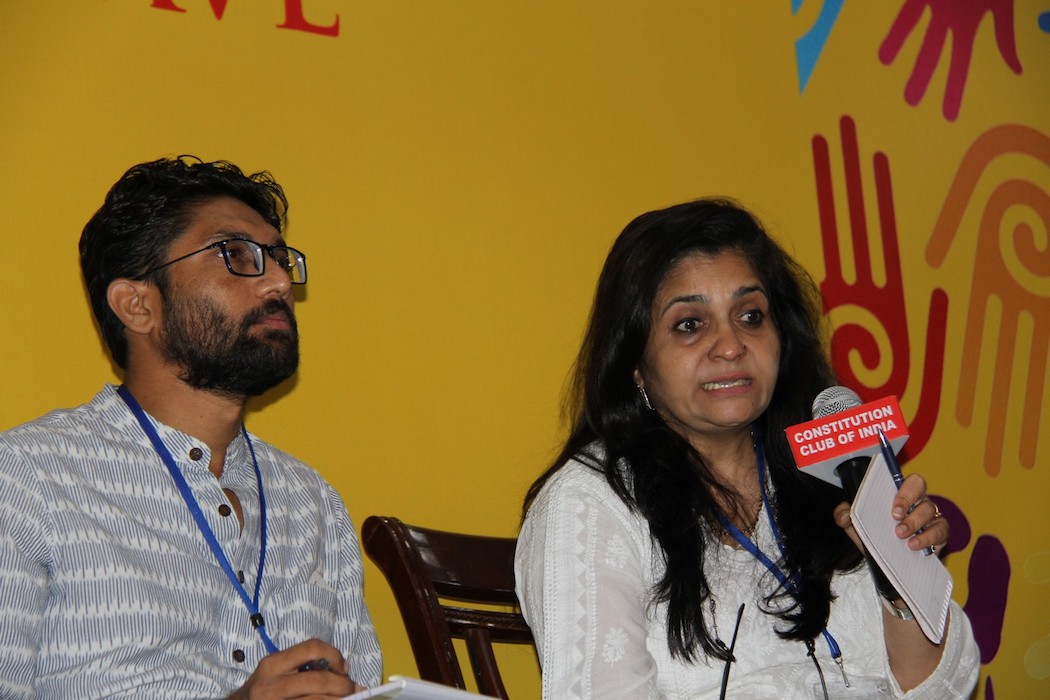BIJAY KUMAR MINJ. Modi's four years 'have weakened India's tolerance'.
June 7, 2018
India Inclusive event hears that attacks against minorities have increased since the BJP came to power

Increasing intolerance against minorities and socially poor Dalit people challenges the idea of an inclusive India, say activists who gathered to mark four years of pro-Hindu government.
Some 200 people including Dalit leaders, activists, academics, media professionals and politicians attended the May 25-27 program in New Delhi to mark the anniversary of Prime Minister Narendra Modi taking office on May 26, 2014.
“On any given day, reports about atrocities against religious minorities, Dalits and tribal people are in the media,” Jignesh Mevani, a Dalit leader and member of the legislative house in Gujarat state, told the event, which had the theme of building an inclusive India.
Mevani, who gained popularity during Gujarat elections by challenging Modi’s statements and claims, said attacks on Dalits had become brutal recently.
He cited the May 20 lynching of a Dalit man as an example.Mukesh Vaniya, a rag picker, was tied up and thrashed to death by a factory owner and his workers in Rajkot district of Gujarat after being accused of theft.
“If we don’t unite and raise our voice, the days are not far away when the fundamentalists will enter our home and rape our mothers and sisters and can kill us because the situation has become such that there is no rule of law,” Mevani said.
Leaders like him accuse Modi’s pro-Hindu Bharatiya Janata Party (BJP) of supporting Hindu groups to accelerate attacks against minorities in their rush to turn India into a nation of upper-caste Hindu hegemony.
The program was organized by India Inclusive, which was formed on May 3 with the objective “to safeguard not only the shared heritage and collective consciousness of India but also protect the idea of an inclusive India.”
Shabnam Hashmi, an activist and Muslim leader, said the forum was working to sustain the inclusive nature of India, which for centuries had accepted divergent religions and cultures.
He said people feel insecure as an atmosphere of hatred based on religion and caste exists across the nation.
In the past four years, incidents of intolerance have increased with lynchings in the name of religion and attacks on Dalits, indigenous people and religious minorities such as Christians and Muslims, Hashmi said.
At least 10 Muslim men have been lynched and many injured by vigilante cow protection groups, many of which seemed to operate with the support of the BJP, rights group Amnesty India said in a report this year.
Persecution Relief, an ecumenical Christian forum, claims it recorded 600 incidents in 2017 of violence against Christians, including destruction of churches, threats and harassment, social boycotts, hate campaigns, abductions, murder, physical violence and attempted murder.
Activist Teesta Setalvad said the media and the poor wereequally manipulated by vested interests. “The time has come where we have to come forward and save our country,” she said.
Tehmina Arora, a rights activist and Christian, said the government was looking for different ways to harass people. For instance, Christian families can be arrested for religious conversion if they hold prayer gatherings at their homes.
Despite the law and constitution allowing religious freedom, “we are bound to live according to the dictates of the divisive forces seen to enjoy the approval of the ruling government,” said Arora, a lawyer who specializes in constitutional law and human rights.
“I see this program as a positive step ahead because at least now people from all faiths are ready to talk and can come to one platform and express their grievances.”
Hashmi tolducanews.comthat India Inclusive plans to organize similar events in many other cities in the coming months.
This article was first published by UCA News on the 30th of May 2018. It was written byBijay Kumar Minj.
